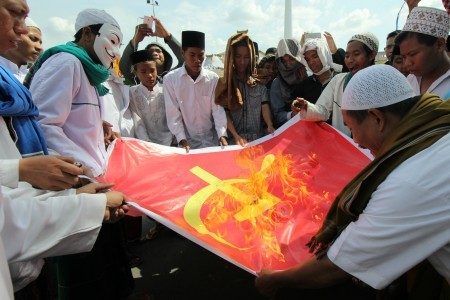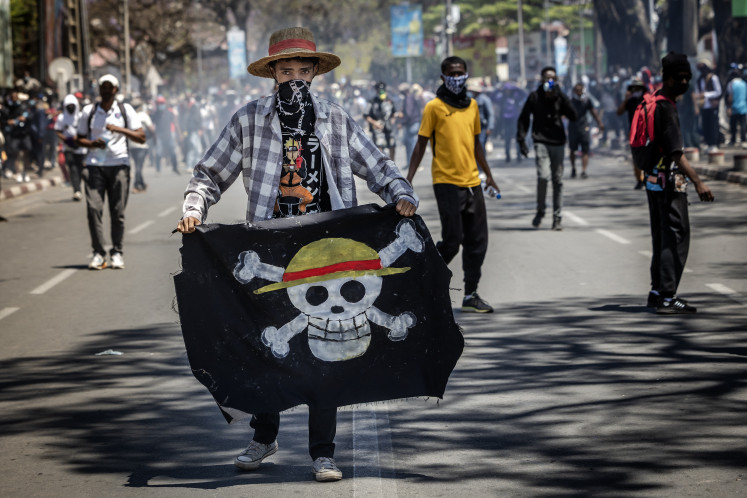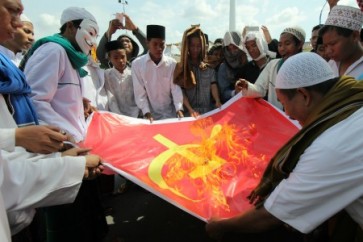Popular Reads
Top Results
Can't find what you're looking for?
View all search resultsPopular Reads
Top Results
Can't find what you're looking for?
View all search resultsCommunists: Not necessarily atheists
One of the narratives to make the ghost more frightening is that communists are atheists, suggesting that they have no place in Indonesia based on Pancasila, the first principle of which is Belief in God.
Change text size
Gift Premium Articles
to Anyone
 Members of hardline group Islamic Defenders' Front (FPI) burn a fabric with a communist symbol in front of East Java Governor Office in Surabaya, East Java on June 1, 2016. They rejected any efforts on reconciliation, rehabilitation and compensation toward members of the now-defunct Indonesian Communist Party (PKI) and also warned public on the danger of communism. (Antara/Didik Suhartono)
Members of hardline group Islamic Defenders' Front (FPI) burn a fabric with a communist symbol in front of East Java Governor Office in Surabaya, East Java on June 1, 2016. They rejected any efforts on reconciliation, rehabilitation and compensation toward members of the now-defunct Indonesian Communist Party (PKI) and also warned public on the danger of communism. (Antara/Didik Suhartono)
S
ome people have tried to exploit the issue of the ghost of the more than 50-year-old defunct Indonesian Communist Party (PKI). One of the narratives to make the ghost more frightening is that communists are atheists, suggesting that they have no place in Indonesia based on Pancasila, the first principle of which is Belief in God.
It was also the main reason why the New Order’s 1985 law on mass organizations declared communism/Marxism-Leninism in contradiction of Pancasila. This provision is still retained in both the 2013 Law on mass organizations and its revised version, the government regulation in lieu of law (Perppu), which was enacted last July.
In theory, that narrative has some truth. Defined exclusively as that of classical Marxism, communism is a political ideology that is atheistic, if not anti-religion. One of the main tenets of Marxism is economic determinism: the “base” or the economic factors (one’s relation to the means of production) determines the “superstructures” (ideology, politics, legal system, culture, religion, etc.). The superstructures will change or disappear depending on the evolutionary interplay among the economic factors.
Communism sees religions as just “expressions of historical stages of development of peoples.” In the communist, classless society, the last stage of that development, it is dreamt that religion will disappear because it has become unnecessary as the bourgeois class that benefits from religion being “the opium of the masses” no longer exists. After all, the Communist Manifesto said communism “abolishes all religion.”
Yet the Indonesian case (and that of many other Muslim-majority countries) tells a different story from what is supposed. Many of Indonesia’s leading advocates of Marxism were Muslims.
At the Fourth Congress of Communist International in 1922 which discussed “the struggle against Pan-Islamism,” where Tan Malaka, the Murba Party’s founder, made a speech (in which he said he was a Muslim) promoted an alliance between communists and pan-Islamists instead, considering the context of the then East Indies which shared the anti-imperialist agenda. The panIslamist movement he referred to was Sarekat Islam (SI), chaired by HOS Tjokroaminoto.
Tjokroaminoto, a teacher of Sukarno (nationalist), Semaoen (communist) and Kartosoewirjo (an Islamist), wrote a book titled Islam dan Sosialisme in which he said that Islam too opposes capitalism and promotes socialist principles. He added that the Marxist concept of “surplus value” (that which is appropriated by the owner of the means of production by exploiting laborers) is the same as riba (usury) which is sinful in Islam.

















